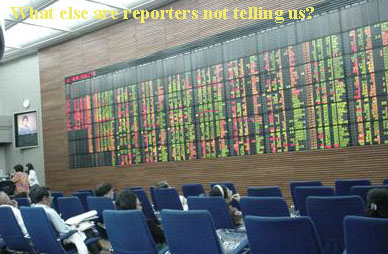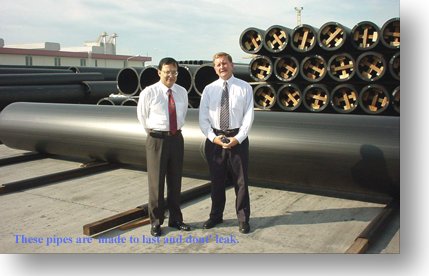True world of investing.
I firmly say do not panic, instead keep accumulating high dividend paying Thai value shares.
Well below are some timely excerpts from "Greed and Fear’s" latest institutional insights. It is very long term bullish on Asia and on the type of stocks I have been advocating here since our beginning in 1997. Longer term members should still be well ahead, even this year, as our advocated picks beat the index. Compare this to the 6-8 year lows which are being posted daily in most all developed stock markets; not to mention Japan, which lately is hitting 19 year lows regularly.
For a decade I had to endure hearing how most SET stocks do not have proper disclosure, how the Thai market is full of holes, how western cultures should view Thai stocks "highly speculative", and so rated "strong avoid". This indeed is how the Phuket Gazette wrote of shares here, not so long ago. Well, they along with many other foreigners, got it very wrong as the long evidence now shows and this year after year!
 Then there is this James K. Glassman to whom I say:
Then there is this James K. Glassman to whom I say:
"Mr. Glassman, please change your column to "Investing in USA and avoid the rest of the world at your peril".
Here then is this overrated and often "finance erroneous" James K. Glassman, whom has a weekly column in the "International Herald Tribune" (IHT). While they call his column "World of Investing", he is the typical inward looking American whom thinks most only about USA, when the practice of stock investing comes up. In his latest gaffe he articulates that the Dow cannot easily go to 5000 because the current average dividend yield on US shares (currently at 1.7%) is close to the 2 year Treasury bond which now yields just about 2%. He reasons "If stocks were yielding 3.6% and the two year T-notes were yielding 6% (as they were not long ago), then stocks would not look particularly attractive. But at these rates, stocks appear extremely inviting". While I agree the Dow will probably not go to 5000, I near explode at his provincial view of "World of Investing".
Please, two deserved observations:
1)
Our many favored "yield horses" bring 7-12% in annual income vs. say a Thai bank CD, which only yields a touch more then 2%. (Thailand does not have a 2 year Treasury note to my knowledge, so I think a bank CD is a close equivalent). In Thailand, the yield relationship on our universe of stocks to safe free returns, is 4 to 1!
Compare this to the US, where it is closer to 1 to 1, as Mr. Glassman explains. So what stock bargains is he talking about in his "World of Investing"? Is USA, the World?
Also, and most importantly, the future expected earnings growth rates in Asia are clearly higher here then in the stagnant and maxed-out US. In finance we can show and prove that double a long-term growth rate is worth more then double the p/e, all other things being equal. But like other factors in the past, he ignores this.
Yet, I know what his answer would surely be: the equity risk premium in USA, deserves to be lower in America, then in Thailand. Oh really? Besides more then triple the average US p/e ratio, compared to the SET, consider: the many & growing corporate scandals, the outrageously excessive corporate salary compensation and very costly fringe benefits, trial lawyer -out of controll- litigation system, high tax system, lower long term growth rates etc.. One truly wonders where the real risks remain? In any event, considering the true world at present, the risk premium does not deserve to be 4 times more in Thailand, then USA! Au contraire.
2) Mr. Glassman is co-author of a book published 2 1/2 years ago called "Dow 36,000". (Publisher: Three Rivers Press; ISBN: 0609806998; 1st edition November 14, 2000). He now says this was "not a prediction but more of an explanation of how stocks should be priced". Even while the full book title had the sentence: "The New Strategy for Profiting from the coming Rise in the Stock Market". Regardless, he pretty much wrote this bullish view, when the US market was peaking, in early 2000. The book review I read quoted him saying "the buy-and-hold strategy is touted as the best way to get rich". Had you done that with US stocks in 2000, you would be much closer to being poor then rich. Yet, as he now writes: "If stocks were yielding 3.6% and two year T-notes were yielding 6% (as they were not long ago), then stocks would not look particularly attractive" Why did this man not tell us that in his Dow bullish book of some years ago?
***
I urge investors not to panic in the current very bearish global environment. Bread and butter" firms with dominant market shares in important basic products, not services, which the world and Thailand needs at the core level. For sure some stock choices may in the future and have not worked out to date; but a prudently diversified portfolio of Thai value shares will at some point bring solid returns and this at lower not higher risk levels! As has been demonstrated here for half a decade.
The SET benchmark has been holding above 330 for many days. This is to be noted as relative strength. I continuously like "real companies in the real economy" with most often low debt levels and high current income, this through tax favored cash dividends. "
Here are the excerpts from "Greed and Fear’s" latest institutional insights, whom I compliment in seeing the true, "World of Investing". MR. Glassman, take note!
"...this is why relative return equity investors should be massively overweight Asian equities in a global portfolio."At this point GREED & fear would like to recommend investors to read a new CLSA report which should be viewed as a manifesto for the long-term case for investing in the Asian equity asset class as the world.s outstanding equity investment opportunity (Asia.s Billion Boomers, 4Q02). "This report seeks to prove the case as to why Asia will be the prime driver of global growth for the next 10 to 20 years and therefore be the world’s premier equity investment story during this period. This argument rests on four main pillars, which are discussed in detail in the report: "They are positive demographics, high savings rates, rising incomes per capita and last but not least, a cultural change in the attitude to spending and indeed pursuit of lifestyle where a younger emerging generation in Asia will proved to be much less conservative than their frugal parents. "This will not just be a question of spending more on existing goods and services but also being prepared to buy a far wider range of goods and services."The exciting point about this story is that it means that Asia has a growth dynamic not driven primarily by American demand cycles. At present most investors, be they Asians themselves or professional fund managers, be they based inside or outside the region, do not really believe this story. "Such a belief will take time to take hold when investors are operating in an environment of growing risk aversion globally and as owners of capital wake up increasingly to the investment implications of deflation.s spread throughout the OECD.
"They are positive demographics, high savings rates, rising incomes per capita and last but not least, a cultural change in the attitude to spending and indeed pursuit of lifestyle where a younger emerging generation in Asia will proved to be much less conservative than their frugal parents. "This will not just be a question of spending more on existing goods and services but also being prepared to buy a far wider range of goods and services."The exciting point about this story is that it means that Asia has a growth dynamic not driven primarily by American demand cycles. At present most investors, be they Asians themselves or professional fund managers, be they based inside or outside the region, do not really believe this story. "Such a belief will take time to take hold when investors are operating in an environment of growing risk aversion globally and as owners of capital wake up increasingly to the investment implications of deflation.s spread throughout the OECD.
"Conviction will probably only come when the American economy is seen to have stalled by which is meant consumption falling at a time when capital spending has not yet recovered and Asian economic growth does not collapse along with it. In the meantime investors in Asian equities are paid more to wait than their counterparts in other equity classes because they are receiving worthwhile income streams on their investments in terms of high dividend yields.
Best Regards to all members,
Paul A. Renaud.
The safe free interest rate as it relates to stock dividends, is far more extreme in Thailand then in USA. I for one am tired of US firms and people there calling things, stuff & services "international", when they are most often not!"

